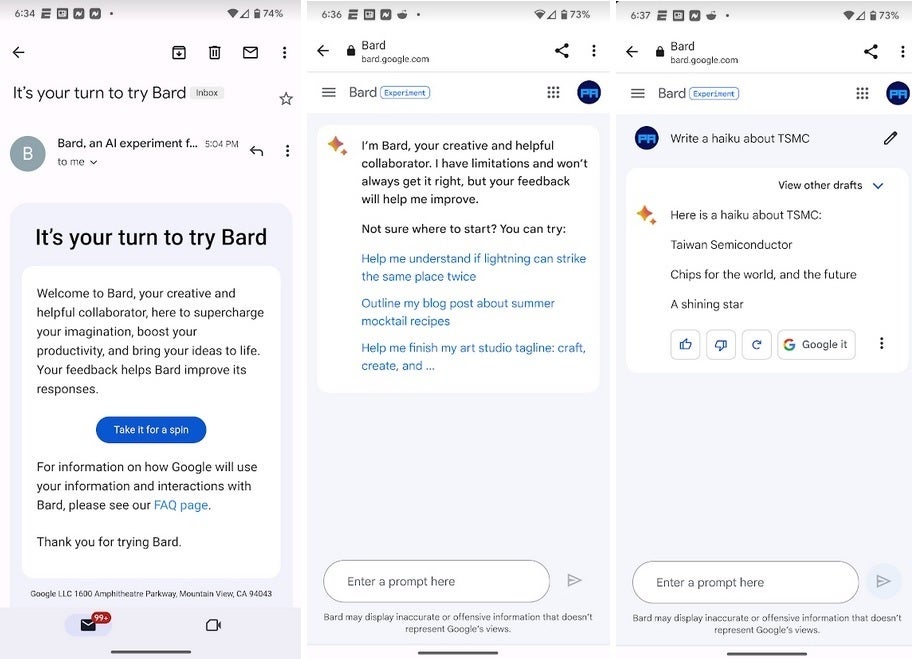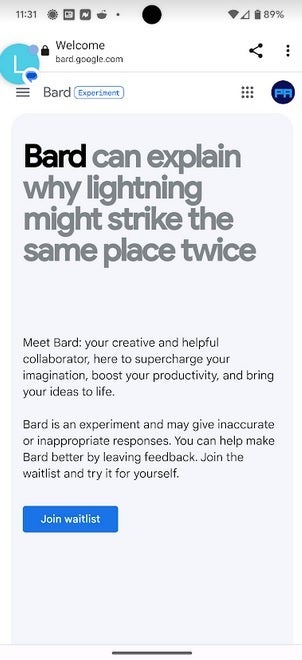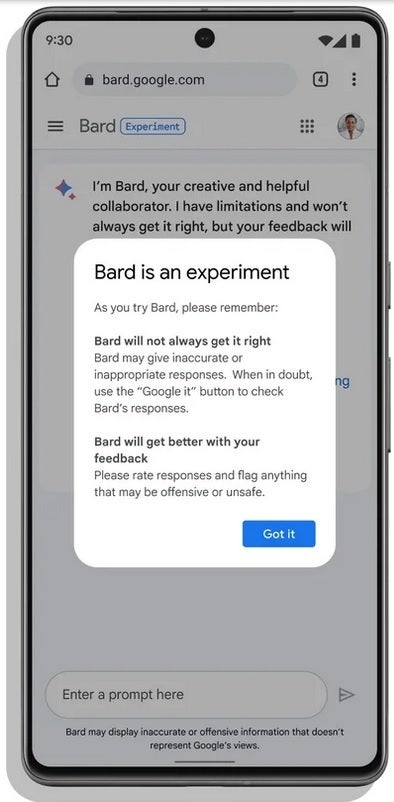Here's how you can join the waitlist for early access to Google's AI chatbot Bard

UPDATE: We were allowed to access Google's AI chatbot Bard after signing up for the waiting list earlier today. Similar to how the integrated ChatGPT works with the New Bing, you simply type in a query. We asked Bard to write us a haiku about chip foundry TSMC and the result was:
Taiwan Semiconductor
Chips for the world, and the future
A shining star
If you've signed up for the Bard waiting list, you might be able to access the AI chatbot sooner than you think. Keep checking your email.

We were given access to Bard and asked it to create a haiku about TSMC
Google this morning announced that it is opening up access to its AI chatbot Bard. Early last month Microsoft announced that it would integrate OpenAI's ChatGPT with its Bing search engine and Google quickly announced its own Bard AI chatbot. Google's fear was that Bing could get Google Search users to switch because of ChatGPT and in a way, we've already seen this as Bing's active daily users tally has risen above 100 million.
Google opens up access to its AI chatbot Bard
Today, Google started opening up access to Bard. In a blog post, Google explained what Bard can do for you. "You can use Bard to boost your productivity, accelerate your ideas and fuel your curiosity. You might ask Bard to give you tips to reach your goal of reading more books this year, explain quantum physics in simple terms, or spark your creativity by outlining a blog post. We’ve learned a lot so far by testing Bard, and the next critical step in improving it is to get feedback from more people."

Those interested in trying out Bard can join the waitlist directly from this email that Google is disseminating
Google sent out emails today that with a tap of a button puts the recipient on a waitlist for Bard. As we pointed out yesterday, some Pixel Superfans are being given early access to Google's conversational AI chatbot. If you didn't receive this email, you can visit bard.google.com (or tap on this link) to join the waiting list. Access to Bard is rolling out starting today in the U.S. and U.K. and will expand to other countries and languages over time.
When you sign up for the waitlist, you will receive an email from Google alerting you that you are now able to access Bard. The latter is powered by a lightweight version of Google's Language Models for Dialog Applications (LaMDA). This is a machine-learning language model that is a chatbot designed to mimic human language. Bard uses this large language model (LLM) and over time it will be replaced with what Google calls "newer, more capable models."
An LLM is similar to a predictive engine. It selects the next word in a response by trying to predict which word should come next. Google says that picking the most probable word would not allow Bard to deliver a creative response so there is some flexibility built in. Google does point out that the more an LLM is used, the better it gets at predicting which word will be most useful. This is why opening up access to Bard is so important.
As with most AI chatbots, there are some caveats
Google does give us some of the typical warnings that even Microsoft mentioned about Bing's use of ChatGPT. For example, because AI chatbots learn from public usage of these tools, responses often reflect the real-world stereotypes and biases that people have. And even if a response from a chatbot sounds like it is correct, it might actually deliver "inaccurate, misleading or false information."

Google points out that Bard is an experiment
As an example, Google shows how Bard incorrectly called the ZZ plant Zamioculcas zamioculcas when it should have been Zamioculcas zamiifolia (come on Bard, everyone knows that). Seriously though, Bard will often give users several different drafts of its response which allows them to select the one that starts off the best for them. You can narrow down the response by asking a follow-up question. Or, if you're not happy with the answers, you can always ask Bard the same query again.
Interestingly, Bard did help Google write the blog post which it posted today. As Google said, "Like all LLM-based interfaces, it didn’t always get things right. But even then, it made us laugh." Google says that it will use feedback from Bard's early users to make the AI chatbot better and better.
Follow us on Google News













Things that are NOT allowed:
To help keep our community safe and free from spam, we apply temporary limits to newly created accounts: